 Backend Development
Backend Development PHP Tutorial
PHP Tutorial PHP extension development: How to separate the implementation and definition of custom functions through interfaces?
PHP extension development: How to separate the implementation and definition of custom functions through interfaces?In PHP extensions, flexibility can be improved by separating the implementation and definition of custom functions through interfaces. First define the interface including function signature and metadata, and then create an implementation class to implement the function code. By registering extension functions and creating implementation objects, defined functions can be used. Benefits include independent unit testing, improved reusability, and improved maintainability.

PHP extension development: implementing and defining custom functions through interface separation
Introduction
In PHP extension development, separating the implementation and definition of custom functions can enhance flexibility and simplify code maintenance. Let's explore how to achieve this using interfaces.
Separation of implementation and definition
The implementation and definition of functions in PHP extensions can be carried out separately. The implementation contains the actual code of the function, while the definition includes the function's signature and metadata.
Using interfaces
To separate implementation and definition, you can use interfaces. An interface defines a set of function signatures that allow different classes to implement its methods.
Example
Consider the following example where we will create an interface and implementation for the hello function:
interface.php
interface HelloInterface {
public function getHello(string $name): string;
}implementation.php
class HelloImplementation implements HelloInterface {
public function getHello(string $name): string {
return "Hello, $name!";
}
}Practical case
Register our function in the extension :
// 在扩展初始加载时注册函数
PHP_FUNCTION(hello) {
$obj = new HelloImplementation(); // 创建实现对象
echo $obj->getHello((string) zend_parse_parameters(ZEND_NUM_ARGS(), 's', $name));
}Using registered functions:
$result = hello('John Doe'); // 调用函数并存储结果Advantages
Separating implementation and definition has the following advantages:
- Testability: Implementations can be unit tested independently of definitions.
- Reusability: Different implementations can reuse the same definition.
- Maintainability: Easier to change the behavior of a function without modifying the definition.
The above is the detailed content of PHP extension development: How to separate the implementation and definition of custom functions through interfaces?. For more information, please follow other related articles on the PHP Chinese website!
 主板aafp是什么接口Aug 29, 2022 am 10:50 AM
主板aafp是什么接口Aug 29, 2022 am 10:50 AM主板上的aafp是音频接口;该接口的功能是启用前面板的“3.5mm”插孔,起到传输音频的作用,aafp跳线基本上由两个部分组成,一部分是固定在主板、硬盘等设备上的,由两根或两根以上金属跳针组成,另一部分是跳线帽,是一个可以活动的组件,外层是绝缘塑料,内层是导电材料,可以插在跳线针上。
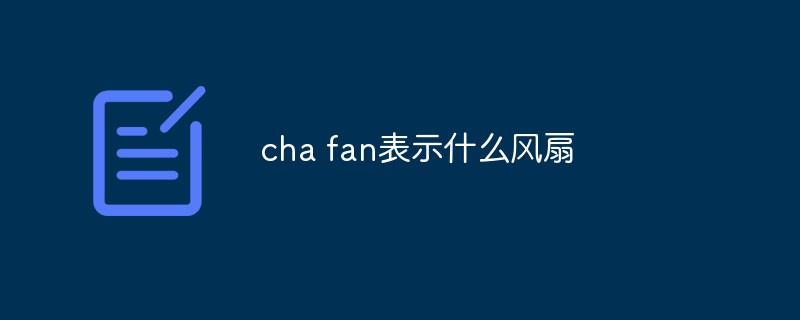 cha fan表示什么风扇Sep 15, 2022 pm 03:09 PM
cha fan表示什么风扇Sep 15, 2022 pm 03:09 PM“cha fan”表示的是机箱风扇;“cha”是“chassis”的缩写,是机箱的意思,“cha fan”接口是主板上的风扇供电接口,用于连接主板与机箱风扇,可以配合温度传感器反馈的信息进行智能的转速调节、控制噪音。
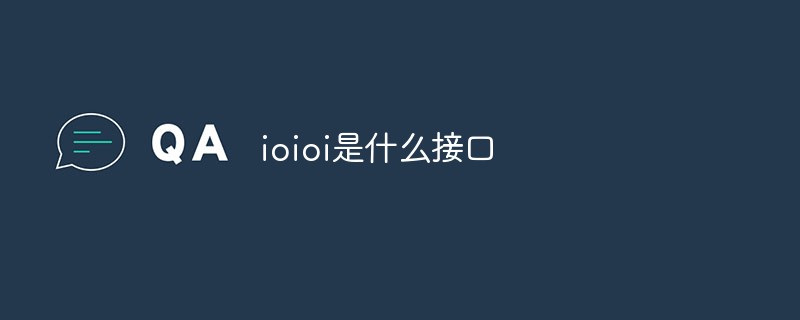 ioioi是什么接口Aug 31, 2022 pm 04:50 PM
ioioi是什么接口Aug 31, 2022 pm 04:50 PMioioi是指COM接口,即串行通讯端口,简称串口,是采用串行通信方式的扩展接口。COM接口是指数据一位一位地顺序传送;其特点是通信线路简单,只要一对传输线就可以实现双向通信(可以直接利用电话线作为传输线),从而大大降低了成本,特别适用于远距离通信,但传送速度较慢。
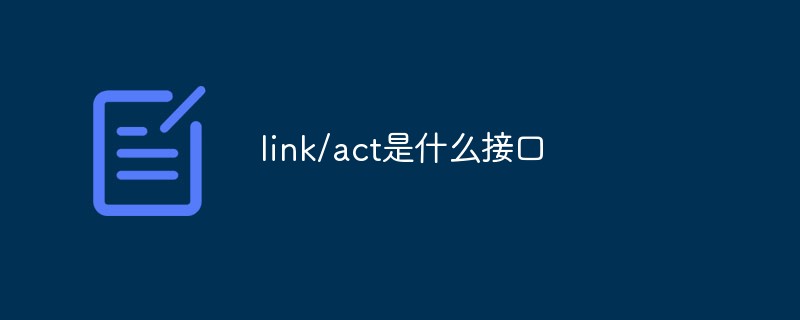 link/act是什么接口Feb 23, 2023 pm 04:14 PM
link/act是什么接口Feb 23, 2023 pm 04:14 PMlink/act是物理数据接口;交换机上的link/act指示灯表示线路是否连接或者活动的状态;通常Link/ACT指示灯用来观察线路是否激活或者通畅;一般情况下,若是线路畅通,则指示灯长亮,若是有数据传送时,则指示灯闪烁。
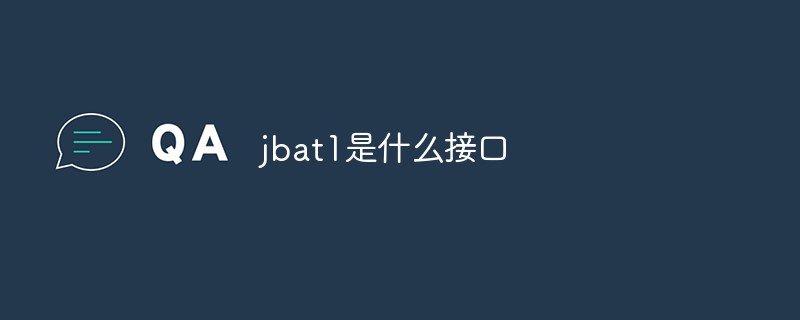 jbat1是什么接口Jun 23, 2021 pm 01:38 PM
jbat1是什么接口Jun 23, 2021 pm 01:38 PMjbat1是主板电2113池放电跳线接口,对于现在市面上常见的主板来说,它们都设计有CMOS的放电跳线,让用户在操作时更加便捷,它也因此成为了CMOS最常见的放电方法。
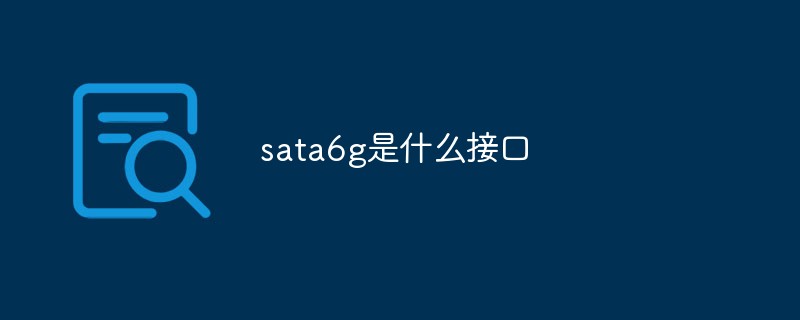 sata6g是什么接口Sep 14, 2022 am 11:46 AM
sata6g是什么接口Sep 14, 2022 am 11:46 AMsata6g是数据传输速度为“6G/s”的sata接口;sata即“Serial ATA”,也就是串行ATA,是主板接口的名称,现在的硬盘和光驱都使用sata接口与主板相连,这个接口的规格目前已经发展到第三代sata3接口。
 dc接口是什么意思Aug 24, 2022 am 10:47 AM
dc接口是什么意思Aug 24, 2022 am 10:47 AMdc接口是一种为转变输入电压后有效输出固定电压接口的意思;dc接口是由横向插口、纵向插口、绝缘基座、叉形接触弹片、定向键槽组成,两只叉型接触弹片定位在基座中心部位,成纵横向排列互不相连,应用于手机、MP3、数码相机、便携式媒体播放器等产品中。
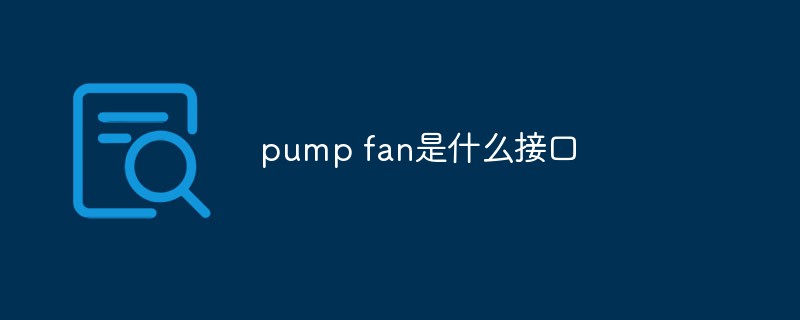 pump fan是什么接口Jun 25, 2021 pm 02:55 PM
pump fan是什么接口Jun 25, 2021 pm 02:55 PMpump fan是散热风扇接口。主板上的风扇接口有cpu fun、sys fun、pump fun,对于一般普通用户来说区别不大,一般接哪个都行,而pump fun上的电流更大一点,用于接功率大一点的水冷风扇头。


Hot AI Tools

Undresser.AI Undress
AI-powered app for creating realistic nude photos

AI Clothes Remover
Online AI tool for removing clothes from photos.

Undress AI Tool
Undress images for free

Clothoff.io
AI clothes remover

AI Hentai Generator
Generate AI Hentai for free.

Hot Article

Hot Tools

Atom editor mac version download
The most popular open source editor

Dreamweaver CS6
Visual web development tools

Safe Exam Browser
Safe Exam Browser is a secure browser environment for taking online exams securely. This software turns any computer into a secure workstation. It controls access to any utility and prevents students from using unauthorized resources.

MantisBT
Mantis is an easy-to-deploy web-based defect tracking tool designed to aid in product defect tracking. It requires PHP, MySQL and a web server. Check out our demo and hosting services.

Zend Studio 13.0.1
Powerful PHP integrated development environment





